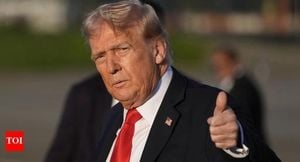In a world increasingly dominated by artificial intelligence, the competitive landscape has taken a dramatic turn as major tech players push the boundaries within the constraints of U.S. regulations. Google and Microsoft, two of the biggest names in tech, are reportedly enabling Chinese companies to access advanced Nvidia AI chips through data centers located outside of China. This move comes as the U.S. government, under the Biden administration, battles to curb Chinese firms' access to American technology, particularly designed for artificial intelligence development. The complexities of international trade have raised eyebrows, sparking debates among tech analysts and policymakers alike.
At the heart of the controversy, as reported by The Information, is the ongoing tension between the U.S. and China regarding high-tech advancements. The Biden administration has made clear its desire to impose stringent trade measures on suppliers of crucial chipmaking machinery if they continue their business relationships with China. With fears of technological espionage and military applications of artificial intelligence, Washington has laid out a series of export controls aimed at stifling China's AI growth.
Microsoft and Google appear to be treading carefully in this sensitive environment. Both companies are allowing Chinese firms to rent servers equipped with Nvidia's A100 and H100 chips, but only from data centers located outside China. This operational structure helps them comply with U.S. export laws while still providing essential AI capabilities to their Chinese customers. Microsoft's move to rent these powerful servers indicates how competitive and interconnected the global tech economy has become, even amidst rising tensions.
The U.S. has been deliberate about this strategy. According to industry insiders, the Biden administration has urged cloud service providers to take a closer look at how foreign entities might be utilizing U.S. data centers to train their AI models. This ensures that sensitive technology doesn’t unintentionally fall into potentially hostile hands. However, it appears that these efforts may not be enough to curb the rising flow of AI advancements into China.
In fact, despite tight restrictions, Nvidia is projected to sell around $12 billion worth of AI chips to Chinese firms this year alone. This projection highlights a significant contradiction at the heart of the situation: while firms like Google and Microsoft claim compliance with U.S. regulations, the reality on the ground suggests that smuggling routes for advanced AI chips have emerged, facilitating a black market that can't be easily controlled. Estimates suggest that approximately 12,500 AI chips are smuggled into China annually, even as Nvidia sold over 2.6 million A100 and H100 chips worldwide last year.
The implications of these developments are profound. For one, this loophole allows China to maintain a degree of technological parity with the U.S., potentially accelerating its advancements in AI applications that could be used in both civilian and military contexts. Not only does this pose a dilemma for U.S. policymakers, whose goal is to restrict Chinese technological growth, but it also raises questions about the effectiveness of current trade restrictions.
Experts are raising concerns about how the actions of these tech giants will shape future relations not just between the U.S. and China but also among allies who are grappling with their roles in this ongoing competition. The intricate dance between ensuring national security and facilitating global commerce is fraught with challenges. The tech giants’ capacity to navigate these waters can potentially redefine the balance of power in the global tech landscape.
As this high-stakes game unfolds, investors are closely monitoring the situation. Stock prices reflect the uncertainty; indeed, just recently, Google shares fell by 1.63% to $180.93 amid mounting concerns regarding its role in providing technology to Chinese firms.
While many may wonder why this matters, consider the broader context. The void created by U.S. tech firms could lead to a strengthening of China's indigenous capabilities. Several Chinese companies have already begun investing heavily in local alternatives, aiming to replicate what was once the exclusive domain of American firms. Should they succeed, the repercussions might not only be dire for U.S. firms but could also lead to a significant shift in the global tech ecosystem.
Recognizing these potential ramifications, industry leaders are calling for a more nuanced approach to trade regulations. Some argue it's vital to engage with Chinese counterparts in a manner that could promote mutual technological growth while safeguarding essential national security interests. Various stakeholders believe that a better-informed strategy is needed—one that balances strict oversight with collaborative international efforts.
Looking ahead, it remains to be seen how the Biden administration will respond to this evolving situation. Will there be stronger measures imposed on tech companies collaborating with China? Or will a more diplomatic approach be adopted to address the deeper issues at play? The answers could reshape not just the future of technology, but also the political landscape and economic interactions of nations worldwide.
While tech innovations abound, a feisty debate about the ethical implications and future trajectory of U.S.-China relations remains at the forefront. "The situation raises questions about responsibility and accountability in tech," warns veteran analyst John Carter. As conservatives and liberal circles alike grapple with the issues at hand, one thing is certain: the chess match between the U.S. and China represents only the early stages of a much more complex game.
A careful balance of policy and innovation will likely define the future as companies strive to maximize profits while navigating the legal intricacies dictated by a rapidly changing global environment.



